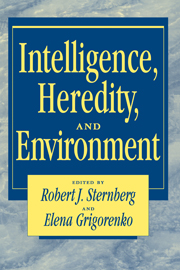Book contents
- Frontmatter
- Contents
- List of contributors
- Preface
- Part I The nature–nurture question: New advances in behavior-genetic research on intelligence
- Part II Novel theoretical perspectives on the genes and culture controversy
- 6 The invalid separation of effects of nature and nurture: Lessons from animal experimentation
- 7 Between nature and nurture: The role of human agency in the epigenesis of intelligence
- 8 A third perspective: The symbol systems approach
- 9 A cultural-psychology perspective on intelligence
- 10 A bio-ecological model of intellectual development: Moving beyond h2
- 11 An interactionist perspective on the genesis of intelligence
- Part III Specific issues in the nature–nurture controversy
- Part IV Integration and conclusions
- Name index
- Subject index
7 - Between nature and nurture: The role of human agency in the epigenesis of intelligence
Published online by Cambridge University Press: 05 June 2012
- Frontmatter
- Contents
- List of contributors
- Preface
- Part I The nature–nurture question: New advances in behavior-genetic research on intelligence
- Part II Novel theoretical perspectives on the genes and culture controversy
- 6 The invalid separation of effects of nature and nurture: Lessons from animal experimentation
- 7 Between nature and nurture: The role of human agency in the epigenesis of intelligence
- 8 A third perspective: The symbol systems approach
- 9 A cultural-psychology perspective on intelligence
- 10 A bio-ecological model of intellectual development: Moving beyond h2
- 11 An interactionist perspective on the genesis of intelligence
- Part III Specific issues in the nature–nurture controversy
- Part IV Integration and conclusions
- Name index
- Subject index
Summary
On both personal and collective levels, human beings are active and creative participants in their own intellectual development. In the course of our everyday lives, we actively solve problems, make decisions, and make sense out of world events and our own roles in them. We are the creative agents in the formation of our own opinions and in the solutions to our life crises, even while we acknowledge the contributions of others to our lives. At a collective level, human beings create culture and civilization, and they participate in the collective problem solving needed to advance social progress in areas such as medicine, education, and civil rights. Indeed, the denial of this capacity for self-determination by traumatic events or repressive social conditions is profoundly damaging to our sense of self (Herman, 1992). Whether on a personal or a collective level, human intellectual development is unmistakably a process of creative self-determination.
This experience of creativity and self-determination is reflected in contemporary scientific accounts of intellectual development as a constructive, self-regulated process. Since the late 1950s, cognitive developmental researchers from virtually every theoretical tradition (Bandura, 1977; Piaget, 1977; Resnick, 1985; White, 1976) have contributed to the now nearly universal consensus that our intellectual skills and abilities are in one way or another the products of our own self-governed activity in relation to the world (Bruner, 1990; Gardner, 1985).
- Type
- Chapter
- Information
- Intelligence, Heredity and Environment , pp. 193 - 242Publisher: Cambridge University PressPrint publication year: 1996
- 15
- Cited by

